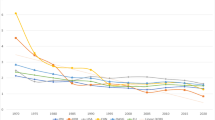Abstract
Hong Kong is now engaged in implementing a programme designed rapidly to expand its Higher Education sector. This policy will effectively shift the role of higher education away from providing for the needs of a small and elite segment of school leavers to one which provides for a significant proportion of the relevant age cohort.
The paper initially identifies the factors which have contributed to the emergence of the new policy. Central amongst these is the impending return of Hong Kong's sovereignty to the PRC in 1997. Subsequently the policy is analysed with reference to the context within which it will be implemented. This includes the shifting demographic structure, the level of emigration and the number of students who study overseas. Finally the paper anticipates the probable impact of the expansion on both higher education itself and on other sectors within the education system.
Similar content being viewed by others
References
Allison, J. (1971).The Essence of Decision: Explaining the Cuban Missile Crisis. Boston: Little Brown.
Becker, G. (1964).Human Capital. New York: Columbia University Press.
Bourdieu, P., and Passeron, J.C. (1977).Reproduction in Education, Society and Culture. Beverley Hills: Sage.
Bowles, S., and Gintis, H. (1976).Schooling in Capitalist America: Educational Reform and the Contradictions of Economic Life. New York: Basic Books.
Chan, M.K. (1989). ‘Full scale restoration of British education: the British sunset in Hong Kong’,Hong Kong Economic Journal.
Collins, R. (1979).The Credential Society: An Historical Sociology of Education and Stratification. New York: Academic Press.
Fulton, O. (1989).Access and Institutional Change. Buckingham: SRHE/Open University Press.
Hong Kong Government (1978).The Development of Senior Secondary and Tertiary Education. Hong Kong: Government Printer.
Hong Kong Government (1990).A Statistical Projection of Manpower Requirements and Supply for Hong Kong. Hong Kong: Government Printer.
Hong Kong Government (1992).Hong Kong 1992: A Review of 1991. Hong Kong: Government Information Services.
Lau, S.K. (1982).Society and Politics in Hong Kong. Hong Kong: Chinese University Press.
Lindblom, C.E. (1959).The Science of ‘Muddling Through’. Public Administration Review.
Luk, B. (1991). ‘Chinese culture in the Hong Kong curriculum: heritage and colonialism’,Comparative Education Review 35, 650–668.
McClelland, G. (1992). ‘Curriculum development in Hong Kong’, in Marsh, C., and Morris, P. (eds.),Curriculum Development in East Asia. London: Falmer.
March, J.G., and Simon, H.A. (1958).Organizations. New York: John Wiley.
Marshall, T.H. (1965). ‘Citizenship and social class’, in Marshall, T.H. (ed.), (1985),Class Citizenship and Social Development. New York: Doubleday Anchor Books.
Meltsner, A.J. (1976).Policy Analysts in the Bureaucracy. USA: University of California Press.
Morris, P., and Sweeting, A.E. (1991). ‘Education and politics: the case of Hong Kong from an historical perspective’,Oxford Review of Education 17(3)
Schultz, T.W. (1961). ‘Education and economic growth (1961)’, in Henry, N. (ed.),Social Forces Influencing American Education. Chicago: University of Chicago Press.
Scott, I. (1989).Political Change and the Crisis of Legitimacy in Hong Kong. Oxford: Oxford University Press.
Simon, B. (1974).The Two Nations and the Educational Structure, 1780–1870. London: Lawrence and Wishart.
Sweeting, A.E., and Morris, P. (1993). ‘Educational reform in post-war Hong Kong: survival and crisis intervention’,International Journal of Educational Development 13(3).
Trow, M. (1974). ‘Problems in the transition from elite to mass higher education’, in: OECD 1974,Policies for Higher Education, OECD: Paris.
Windolf, P. (1992). ‘Cycles of expansion in higher education 1870–1985: an international comparison’,Higher Education 23, 3–19.
Young, M. (1958).The Rise of the Meritocracy, 1870–2033. London: Thomas and Hudson.
Yung, Man-Sing (1991). ‘Different interpretations of the relationship between higher education and the labour market and predictions of the effects of higher education expansion in Hong Kong,CUHK Education Journal 19, 93–102.
Author information
Authors and Affiliations
Rights and permissions
About this article
Cite this article
Morris, P., McClelland, J.A.G. & Ming, Y.Y. Higher Education in Hong Kong: the context of and rationale for rapid expansion. High Educ 27, 125–140 (1994). https://doi.org/10.1007/BF01384085
Issue Date:
DOI: https://doi.org/10.1007/BF01384085



